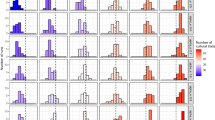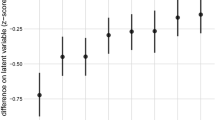Abstract
An emerging literature on the evolution of culture can offer new explanations for how norms encourage or obstruct sustainable practices. In particular, dual-inheritance theory describes how interactions between genetic and cultural evolution give rise, in part, to prosociality. Based on this theory, we identify the concept of normative motivation — internalized desires to follow and enforce norms. We discuss the utility of this concept in progressing two major research agendas across the social and behavioural sciences: the impact of motivation on cognition and normative behaviour, and the influence of norms on the policy process. Key contributions from considering norms from this evolutionary perspective include: (1) an improved model of the motivations that lead individuals to follow norms, (2) clarification of how and when incentives successfully generate motivations favouring sustainability and (3) new ideas for leveraging the influence of norms in public policy beyond financial incentives and education campaigns.
This is a preview of subscription content, access via your institution
Access options
Access Nature and 54 other Nature Portfolio journals
Get Nature+, our best-value online-access subscription
$29.99 / 30 days
cancel any time
Subscribe to this journal
Receive 12 digital issues and online access to articles
$119.00 per year
only $9.92 per issue
Buy this article
- Purchase on Springer Link
- Instant access to full article PDF
Prices may be subject to local taxes which are calculated during checkout



Similar content being viewed by others
Change history
18 June 2018
Owing to a technical error, this Perspective was originally published without its received and accepted dates; the dates ‘Received: 29 November 2017; Accepted: 9 April 2018’ have now been included in all versions.
References
Chudek, M. & Henrich, J. Culture–gene coevolution, norm-psychology and the emergence of human prosociality. Trends Cogn. Sci. 15, 218–226 (2011).
Gintis, H. The hitchhiker’s guide to altruism: gene–culture coevolution and the internalization of norms. J. Theor. Biol. 220, 407–418 (2003).
Sripada, C. S. & Stich, S. in The Innate Mind: Volume 2: Cognition and Culture (eds Carruthers, P. et al.) 280–301 (Oxford Univ. Press, New York, NY, 2006).
Farrow, K., Grolleau, G. & Ibanez, L. Social norms and pro-environmental behavior: a review of the evidence. Ecol. Econ. 140, 1–13 (2017).
Nyborg, K. et al. Social norms as solutions. Science 354, 42–43 (2016).
Bicchieri, C. Norms in the Wild: How to Diagnose, Measure, and Change Social Norms (Oxford Univ. Press, New York, NY, 2017).
Smith, J. R. et al. Congruent or conflicted? The impact of injunctive and descriptive norms on environmental intentions. J. Environ. Psychol. 32, 353–361 (2012).
Kinzig, A. P. et al. Social norms and global environmental challenges: the complex interaction of behaviors, values, and policy. BioScience 63, 164–175 (2013).
Raymond, L. et al. Making change: norm-based strategies for institutional change to address intractable problems. Polit. Res. Q. 67, 197–211 (2014).
Okereke, C. Equity norms in global environmental governance. Glob. Environ. Polit. 8, 25–50 (2008).
May, P. J. Regulation and compliance motivations: examining different approaches. Public Admin. Rev. 65, 31–44 (2005).
Raymond, L. Reclaiming the Atmospheric Commons: The Regional Greenhouse Gas Initiative and a New Model of Emissions Trading (MIT Press, Cambridge, MA, 2016).
Trivers, R. L. The evolution of reciprocal altruism. Q. Rev. Biol. 46, 34–57 (1971).
Tooby, J. & Cosmides, L. in The Adapted Mind: Evolutionary Psychology and the Generation of Culture (eds Barkow, J. et al.) 19–136 (Oxford Univ. Press, New York, NY, 1992).
Chudek, M., Zhao, W. & Henrich, J. in Cooperation and Its Evolution (eds Sterelny, K. et al.) 425–459 (MIT Press, Cambridge, MA, 2013).
Henrich, J. The Secret of Our Success: How Culture is Driving Human Evolution, Domesticating Our Species, and Making Us Smarter (Princeton Univ. Press, Princeton, NJ, 2016).
Richerson, P. J. & Boyd, R. Not by Genes Alone: How Culture Transformed Human Evolution (Univ. Chicago Press, Chicago, IL, 2005).
Holden, C. & Mace, R. Phylogenetic analysis of the evolution of lactose digestion in adults. Hum. Biol. 81, 597–619 (1997).
Boyd, R. & Richÿerson, P. J. Culture and the evolution of human cooperation. Phil. Trans. R. Soc. B 364, 3281–3288 (2009).
Olive, A. Land, Stewardship, and Legitimacy: Endangered Species Policy in Canada and the United States (Univ. Toronto Press, Toronto, 2014).
Schwartz, S. H. Normative influences on altruism. Adv. Exp. Soc. Psychol. 10, 221–279 (1977).
Stern, P. C., Dietz, T., Abel, T., Guagnano, G. A. & Kalof, L. A value-belief-norm theory of support for social movements: the case of environmentalism. Hum. Ecol. Rev. 6, 81–97 (1999).
Davis, T. & Kelly, D. Norms, not moral norms: the boundaries of morality do not matter. Behav. Brain Sci. (in the press).
van der Linden, S. Warm glow is associated with low- but not high-cost sustainable behaviour. Nat. Sustain 1, 28–30 (2018).
Sperber, D. & Baumard, N. Moral reputation: an evolutionary and cognitive perspective. Mind Lang. 27, 495–518 (2012).
Schmidt, M., Butler, L., Heinz, J. & Tomasello, M. Young children see a single action and infer a social norm: promiscuous normativity in 3-year-olds. Psychol. Sci. 27, 1360–1370 (2016).
Kenward, B., Karlsson, M. & Persson, J. Over-imitation is better explained by norm learning than by distorted causal learning. Proc. R. Soc. B 278, 1239–1246 (2011).
Chudek, M., Brosseau-Laird, P., Birch, S. & Henrich, J. in Navigating the Social World: What Infants, Children, and Other Species Can Teach Us (eds Banaji, M. & Gelman, S.) 181–185 (Oxford Univ. Press, New York, NY, 2013).
Chudek, M., Heller, S., Birch, S. & Henrich, J. Prestige-biased cultural learning: bystander’s differential attention to potential models influences children’s learning. Evol. Hum. Behav. 33, 46–56 (2012).
Cialdini, R. B., Kallgren, C. A. & Reno, R. R. A focus theory of normative conduct: a theoretical refinement and reevaluation of the role of norms in human behavior. Adv. Exp. Soc. Psychol. 24, 201–234 (1991).
Goldstein, N. J., Cialdini, R. B. & Griskevicius, V. A room with a viewpoint: using social norms to motivate environmental conservation in hotels. J. Consum. Res. 35, 472–482 (2008).
Schultz, P. W. et al. The constructive, destructive, and reconstructive power of social norms. Psychol. Sci. 18, 429–434 (2007).
Finnemore, M. & Sikkink, K. International norm dynamics and political change. Int. Organ 52, 887–917 (1998).
Allcott, H. Social norms and energy conservation. J. Public Econ. 95, 1082–1095 (2011).
Rothberger, H. Real men don’t eat (vegetable) quiche: masculinity and the justification of meat consumption. Psychol. Men. Masc. 14, 363–375 (2013).
Kunda, Z. The case for motivated reasoning. Psychol. Bull. 108, 480–498 (1990).
Hennes, E. P., Ruisch, B. C., Feygina, I., Monteiro, C. A. & Jost, J. T. Motivated recall in the service of the economic system: the case of anthropogenic climate change. J. Exp. Psychol. Gen. 145, 755–771 (2016).
Taylor, S. E. & Brown, J. D. Illusion and well-being: a social psychological perspective on mental health. Psychol. Bull. 103, 193–210 (1988).
Kavka, G. S. in Morality, Reason and Truth: New Essays on the Foundations of Ethics (eds Copp, D. & Zimmermann, D.) 297–319 (Rowman & Allanheld, Totowa, NJ, 1984).
Ryan, R. M. & Deci, E. L. Self-determination theory and the facilitation of intrinsic motivation, social development, and well-being. Am. Psychol. 55, 68–78 (2000).
Gneezy, U., Meier, S. & Rey-Biel, P. When and why incentives (don’t) work to modify behavior. J. Econ. Perspect. 25, 191–209 (2011).
Frey, B. S. & Oberholzer-Gee, F. The cost of price incentives: an empirical analysis of motivation crowding-out. Am. Econ. Rev. 87, 746–755 (1997).
van der Linden, S. Intrinsic motivation and pro-environmental behaviour. Nat. Clim. Change 5, 612–613 (2015).
Yoeli, E., Hoffman, M., Rand, D. G. & Nowak, M. A. Powering up with indirect reciprocity in a large-scale field experiment. Proc. Natl Acad. Sci. USA 110, E10424–E10429 (2013).
Thaler, R. H. & Sunstein, C. R. Nudge: Improving Decisions About Health, Wealth and Happiness (Yale Univ. Press, New Haven, CT, 2008).
Bem, D. J. Self-perception: an alternative interpretation of cognitive dissonance phenomena. Psychol. Rev. 74, 183–200 (1967).
Witt, U. Learning to consume: a theory of wants and the growth of demand. J. Evol. Econ. 11, 23–36 (2001).
Kelman, M. Market discrimination and groups. Stanf. Law Rev. 53, 833–896 (2001).
Waring, T. & Acheson, J. Evidence of cultural group selection in territorial lobstering in Maine. Sustain. Sci. 13, 21–34 (2018).
Mortensen, C. R. et al. Trending norms: a lever for encouraging behaviors performed by the minority. Soc. Psychol. Pers. Sci. https://doi.org/10.1177/1948550617734615 (2017).
Ellickson, R. C. Order Without Law: How Neighbors Settle Disputes (Harvard Univ. Press, Cambridge, MA, 1991).
Brook, A., Zint, M. & De Young, R. Landowners’ responses to an Endangered Species Act listing and implications for encouraging conservation. Conserv. Biol. 17, 1638–1649 (2003).
Friedman, E. J., Hochstetler, K. & Clark, A. M. Sovereignty, Democracy, and Global Civil Society: State-Society Relations at UN World Conferences (SUNY Press, Albany, NY, 2005).
Hochstetler, K. & Milkoreit, M. Emerging powers in the climate negotiations: shifting identity conceptions. Polit. Res. Q. 67, 224–235 (2014).
Feygina, I., Jost, J. T. & Goldsmith, R. E. System justification, the denial of global warming, and the possibility of “system-sanctioned change”. Pers. Soc. Psychol. Bull. 36, 326–338 (2010).
Baumgartner, F. R., De Boef, S. L. & Boydstun, A. E. The Decline of the Death Penalty and the Discovery of Innocence (Cambridge Univ. Press, New York, NY, 2008).
Baunach, D. M. Decomposing trends in attitudes toward gay marriage, 1988-2006. Soc. Sci. Q. 92, 346–363 (2011).
Keck, M. E. & Sikkink, K. in The Social Movement Society: Contentious Politics for a New Century (eds Meyer, D. S. & Tarrow, S. G.) 217–238 (Rowman & Littlefield Publishers, Lanham, MD, 1998).
Acknowledgements
The authors are grateful to B. Mihalec-Adkins, A. Roach and E. Ozgumus for their research assistance and to the Social Cognition of Social Justice Lab and participants in the Purdue University Center for the Environment Workshop on New Perspectives on Sustainability and Resilience for feedback. The authors also thank D. Kelly and A. Zabala for their helpful comments. Finally, the authors thank S. Bond and M. Lifton for help with figures, as well as the Purdue Center for the Environment and Department of Psychological Sciences for financial support for this work.
Author information
Authors and Affiliations
Contributions
T.D., E.P.H. and L.R. contributed equally to the conceptualization, research and writing of this Perspective.
Corresponding author
Ethics declarations
Competing interests
The authors declare no competing interests.
Additional information
Publisher’s note: Springer Nature remains neutral with regard to jurisdictional claims in published maps and institutional affiliations.
Rights and permissions
About this article
Cite this article
Davis, T., Hennes, E.P. & Raymond, L. Cultural evolution of normative motivations for sustainable behaviour. Nat Sustain 1, 218–224 (2018). https://doi.org/10.1038/s41893-018-0061-9
Received:
Accepted:
Published:
Issue Date:
DOI: https://doi.org/10.1038/s41893-018-0061-9
This article is cited by
-
Restricted and large-scale sustainability
Sustainability Science (2024)
-
An integrative framework for transformative social change: a case in global wildlife trade
Sustainability Science (2022)
-
Philosophy of sustainability experimentation _ experimental legacy, normativity and transfer of evidence
European Journal for Philosophy of Science (2021)
-
Philosophy of science for sustainability science
Sustainability Science (2020)
-
A more dynamic understanding of human behaviour for the Anthropocene
Nature Sustainability (2019)



